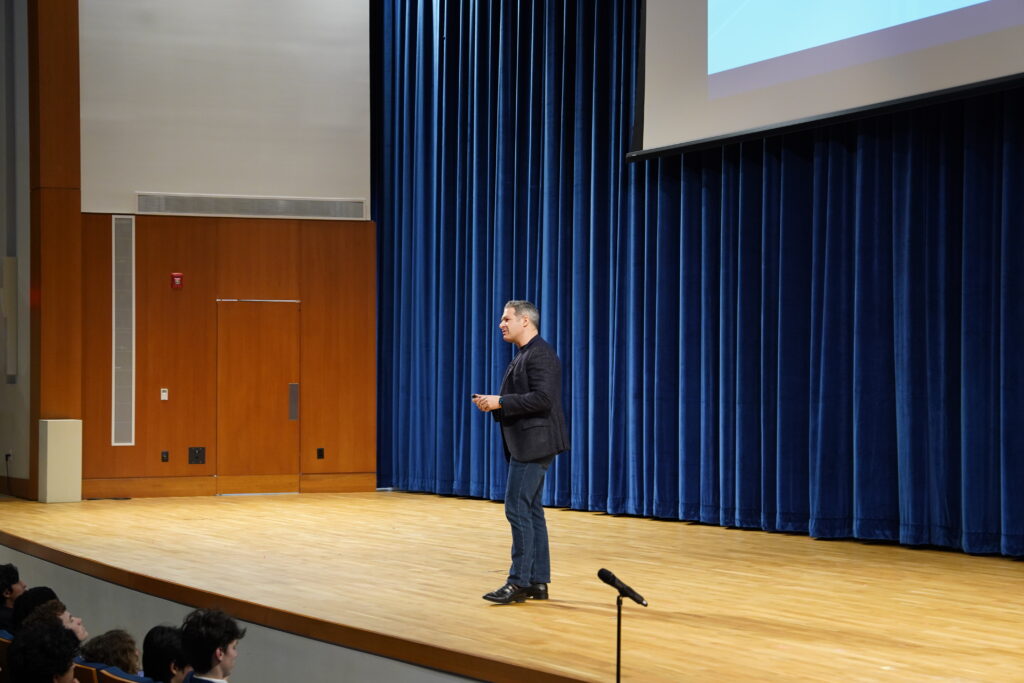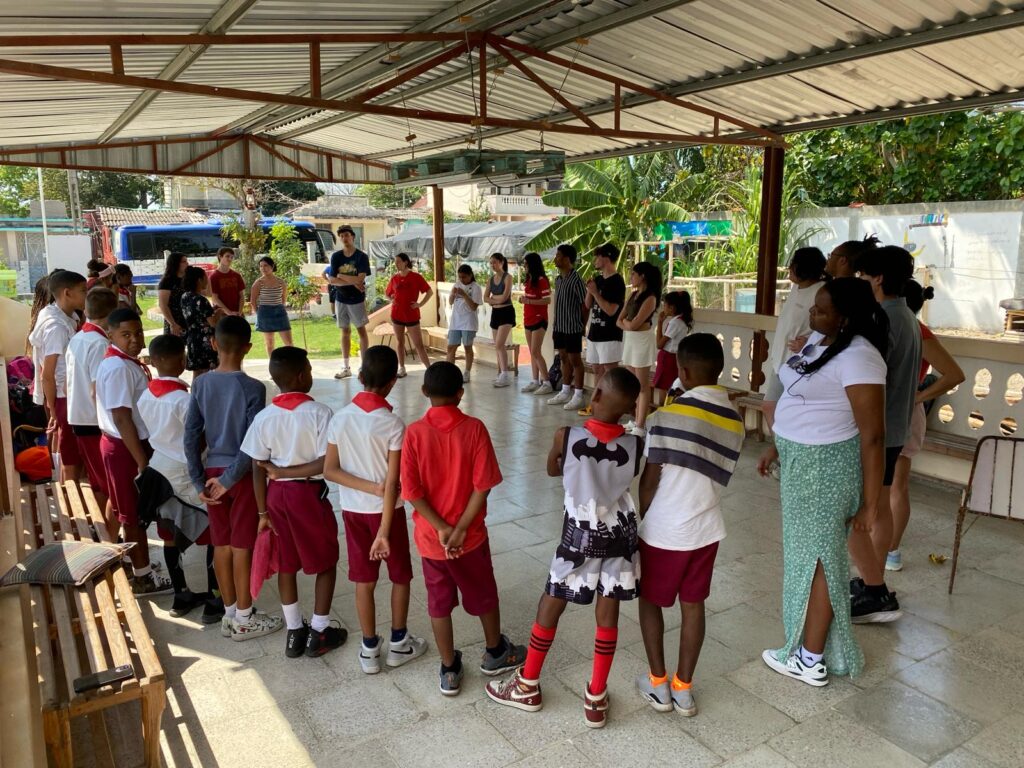
Dr. Ethan Kross, this year’s E. Phillips Speaker, speaks in Colony Hall.

Dr. Ethan Kross dines with students in the Abnormal Psychology and Advanced Topics in Psychology classes following his presentation.
By Adrian Torres ’25
At School Meeting on January 30, Choate welcomed this year’s E. Phillips Speaker and acclaimed psychologist, Dr. Ethan Kross, to teach the community about “chatter”— the inner voice inside a person’s head. Dr. Kross, a professor at the University of Michigan and expert on emotion regulation, specializes in the study of how individuals can channel their inner voice to improve their lives. He is also the author of the best-selling book, Chatter: The Voice in Our Head, Why It Matters, and How to Harness It, which students had the opportunity to receive a signed copy of after the meeting.
In the spring of 2023, Director of Studies Ms. Ellen Devine began working on inviting Dr. Kross to inform the community of strategies to help combat mental health challenges. “One priority that the School has had is to think a lot about mental health and wellbeing on a lot of fronts,” Ms. Devine said. “One of the ways that we’ve done that is bringing major psychologists who are also researchers and who are really effective speakers to campus to talk about different ways of maintaining mental health.”
After an introduction by Zainab Khokha ’24, Dr. Kross began his speech by introducing the concept of “chatter,” describing it as a “remarkable tool of the mind” that keeps our mind active and makes meaning out of life. However, he later explained that chatter can also create problems: chatter can make it difficult to think and perform, absorb one’s attention and energy, induce chronic stress, and cause them to push others away.
Instead of silencing chatter, Dr. Kross advocated for harnessing it through mental tools. The first tool he suggested was distanced self-talk, which entails speaking to yourself in the third person. Since humans tend to take others’ advice more often than their own, he argued that tricking the mind into believing it was taking someone else’s advice would help solve problems more effectively.
Next, he recommended the “mental time travel” tool, which involves viewing a current problems from the perspective of your younger or older self. For example, if you wake up hysterical in the middle of the night, Dr. Kross recommended time travel to the morning. Remembering yourself with a cup of coffee in hand and the sun shining, your worries shouldn’t seem as overwhelming.
Dr. Kross shared relationship tools that students can employ to assist those around them with controlling their chatter, such as expressing empathy and validation while offering constructive advice. He also gave students environmental tools to quiet down their inner voice, such as organizing your personal spaces, creating daily rituals, or taking a moment to appreciate the outdoors.
Students benefited from Dr. Kross’s strategies for managing chatter. “I personally took away that small things help a lot. Even if they’re not very big, they can create a meaningful change,” Nicholas Huber ’25 said.
Khokha also left the meeting feeling inspired. “I really took away the fact that venting doesn’t really help. I’m someone who likes to use venting as my outlet if I’m really upset about something or there’s a lot of chatter that I should get out.” She will try to apply Dr. Kross’s strategies to help her better manage her own chatter.
To conclude his speech, Dr. Kross explained the importance of finding the tools that work best for each individual when managing their unique chatter, with which students resonated.
“I also really appreciated how he emphasized that the practices he gave us to manage chatter were not supposed to be universal,” Khoka said. Dana Tan ’25 agreed, saying, “I think that everyone has their own habits and personalities so managing your chatter really comes down to what fits best into your lifestyle.”
Reflecting on Dr. Kross’ visit, Ms. Devine hopes students found the talk helpful and relevant. “My primary hope is that students had takeaways that felt lasting, applicable, and meaningful … that people felt it was a meaningful and worthy way to spend their time during a School Meeting,” she said.
Following the lecture, students in the Abnormal Psychology and Advanced Topics in Psychology classes attended a luncheon with Dr. Kross in Sally Hart Lodge. They discussed overpathologizing abnormal behavior and extended their conversation about chatter. “It was a good opportunity to ask him follow- up questions,” Abnormal Psychology student Lindsay Hong ’25 said. “Someone asked a question about his book being used as an intervention for managing stress.”
Dr. Kross’s presentation opened doors to more discussions around mental health at the School. “I think his presence inspired a lot of curiosity and eagerness to talk more about a lot of different topics,” Ms. Devine said.




